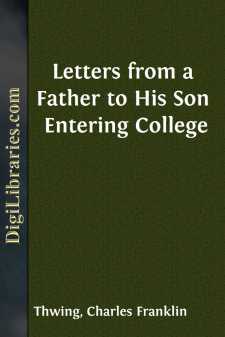Categories
- Antiques & Collectibles 13
- Architecture 36
- Art 48
- Bibles 22
- Biography & Autobiography 813
- Body, Mind & Spirit 142
- Business & Economics 28
- Children's Books 15
- Children's Fiction 12
- Computers 4
- Cooking 94
- Crafts & Hobbies 4
- Drama 346
- Education 46
- Family & Relationships 57
- Fiction 11828
- Games 19
- Gardening 17
- Health & Fitness 34
- History 1377
- House & Home 1
- Humor 147
- Juvenile Fiction 1873
- Juvenile Nonfiction 202
- Language Arts & Disciplines 88
- Law 16
- Literary Collections 686
- Literary Criticism 179
- Mathematics 13
- Medical 41
- Music 40
- Nature 179
- Non-Classifiable 1768
- Performing Arts 7
- Periodicals 1453
- Philosophy 64
- Photography 2
- Poetry 896
- Political Science 203
- Psychology 42
- Reference 154
- Religion 513
- Science 126
- Self-Help 84
- Social Science 81
- Sports & Recreation 34
- Study Aids 3
- Technology & Engineering 59
- Transportation 23
- Travel 463
- True Crime 29
Letters from a Father to His Son Entering College
Description:
Excerpt
My Dear Boy:—I am glad you want to go to college. Possibly I might send you even if you did not want to go, yet I doubt it. One may send a boy through college and the boy is sent through. None of the college is sent through him. But if you go, I am sure a good deal of the college will somehow get lodged in you.
You will find a thousand and one things in college which are worth while. I wish you could have each of them, but you can not. You have to use the elective system, even in the Freshman year. The trouble is not that so few boys do not seem to know how to distinguish the good from the bad, but that so many boys do not know the better from the good and the best from the better. I have known thousands of college boys, and they do not seem to distinguish, or, if they do, they do not seem to be able to apply the gospel of difference.
You won't think me imposing on you—will you?—if before entering college I tell you of some things which seem to me to be most worthy of your having and being on the day you get your A. B.
The first thing I wish to say to you is that I want you to come out of the college a thinker. But how to make yourself a thinker is both hard to do and hard to tell. Yet, the one great way of making yourself a thinker is to think. Thinking is a practical art. It cannot be taught. It is learned by doing. Yet there are some subjects in the course which seem to me to be better fitted than others to teach you this art. I've been trying to find out what are some of the marks or characteristics of these subjects. They are, I believe, subjects which require concentration of thought; subjects which have clearness in their elements, yet which are comprehensive, which are complex, which are consecutive in their arrangements of parts, each part being closely, rigorously related to every other, which represent continuity, of which the different elements or parts may be prolonged unto far reaching consequences. Concentration in the thinker, clearness, comprehensiveness, complexedness, consecutiveness, continuity—there are the six big C's, which are marks of the subjects which tend to create the thinker.
To attempt to apply each of these marks to many different subjects of the curriculum represents a long and unduly stupefying labor. Apply them for yourself. Different subjects have different worths for the students, but there are certain recognized values attached to each coin of the intellectual realm.
Mathematics and pure physics eminently represent the larger part of these six elements which I have named. Mathematics demands concentration. Mathematics is, in a sense, the mind giving itself to certain abstract truths. What is X but a form of the mind? Mathematics demands clearness of thinking and of statement. Without clearness mathematics is naught. It also represents comprehensiveness. The large field of its truth is pressed into its greater relationships. Mathematical truth is complex. Part is involved with part. It is consecutive. Part follows part in necessary order. It is also continuous. It represents a graded progress.
It is, however, to be remembered that the reasoning of mathematics is unlike most reasoning which we usually employ. Mathematical reasoning is necessary. Most reasoning is not necessary. That two plus two equal four is a truth about which people do not differ usually....


